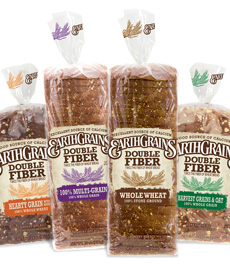NEWS: Sara Lee “Organics” Controversy
| Boo, Sara Lee!
According to corporate and governmental watchdog, The Cornucopia Institute, a nonprofit farm policy research group, Sara Lee is trying to pull one over on consumers. The popular supermarket brand has launched a marketing campaign for its EarthGrains bread, using misleading environmental-friendly catchphrases with the hope of attracting people who want to buy organics because they’re better for the environment and healthier to eat. Sara Lee claims that “Eco-Grain™”—its trademarked ingredient that comprises just 20% of the grain in EarthGrains breads—is more sustainable than organic grain. This is not true, and the Cornucopia Institute has created a comparison chart to detail the differences. |

Sara Lee’s EarthGrains line. Not particularly |
|
According to Charlotte Vallaeys, a Food and Farm Policy Analyst at The Cornucopia Institute, “Sara Lee is doing practically nothing to ensure its ingredients are truly ecologically produced. It’s a crass example of a corporation trying to capitalize on the valuable market cachet of organic, while intentionally misleading consumers—without making any meaningful commitment to protect the environment or produce safer and more nutritious food.”
To educate consumers about EarthGrains bread made with Eco-Grain wheat, Sara Lee launched a consumer marketing program called “The Plot to Save the Earth, One Field at a Time.“ The campaign includes print, TV, radio and digital advertising, public relations, social media and point-of-sale materials that take a whimsical approach to catch consumers’ eyes with tag lines like, “How your turkey sandwich can help preserve the earth.” “If advertising executives could be charged with malpractice, this would be a major felony,” said Mark A. Kastel, Co-Director at The Cornucopia Institute. Now that you’re aware, make your own decisions. If you want to help the environment and eat pesticide-free food, look for the USDA certified organic seal. Sara Lee also owns the brands Ambi Pur, Ball Park, Douwe Egberts, Hillshire Farm, Jimmy Dean, Kiwi, Sanex and Senseo. |
||

